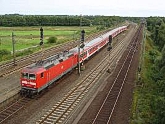The German train drivers' union GDL said would strike again on passenger and freight routes from January 7.
The dispute between the German train drivers' union (GDL) and rail operator Deutsche Bahn started in March.
The GDL argues its 34,000 drivers are underpaid compared to their European counterparts. It demanded a separate wage deal from one agreed by the railway's 195,000 other workers which gave them a 4.5 percent pay rise. After calling for increases of up to 31 percent in past months, GDL signalled it could accept rises of 10 to 15 percent.
Deutsche Bahn wants one deal for all workers - still unresolved - and has rejected GDL pay demands as unrealistic.
Strikes, which were rare in Germany, started in July on both freight and passenger routes and culminated in a 62-hour rail strike in November which was Germany's biggest.
An economic think tank said the stoppages cost Europe's biggest economy US$110 million a day.
The stoppages hurt firms which rely on tightly scheduled deliveries. Car maker Audi cancelled a shift at one of its plants due to parts shortages. A lack of goods trains caused bottlenecks at Hamburg port and Germany's retail association said the strikes had hurt sales.
Deutsche Bahn says an offer made to Deutsche Bahn earlier this month foresees wage increases of between 8 and 13 percent.
Under the terms of the offer, the GDL would not receive a deal that is separate from other Bahn workers. The union has said this key demand is non-negotiable.
Deutsche Bahn is Germany's largest employer. The company carried 1.85 billion passengers last year - some 5 million per day - and had revenues of $50.1 billion. Chancellor Angela Merkel's government planned to partially privatise the firm by 2009 but the strikes and wrangling within her coalition over terms have put those plans at risk.
CargonewsAsia













